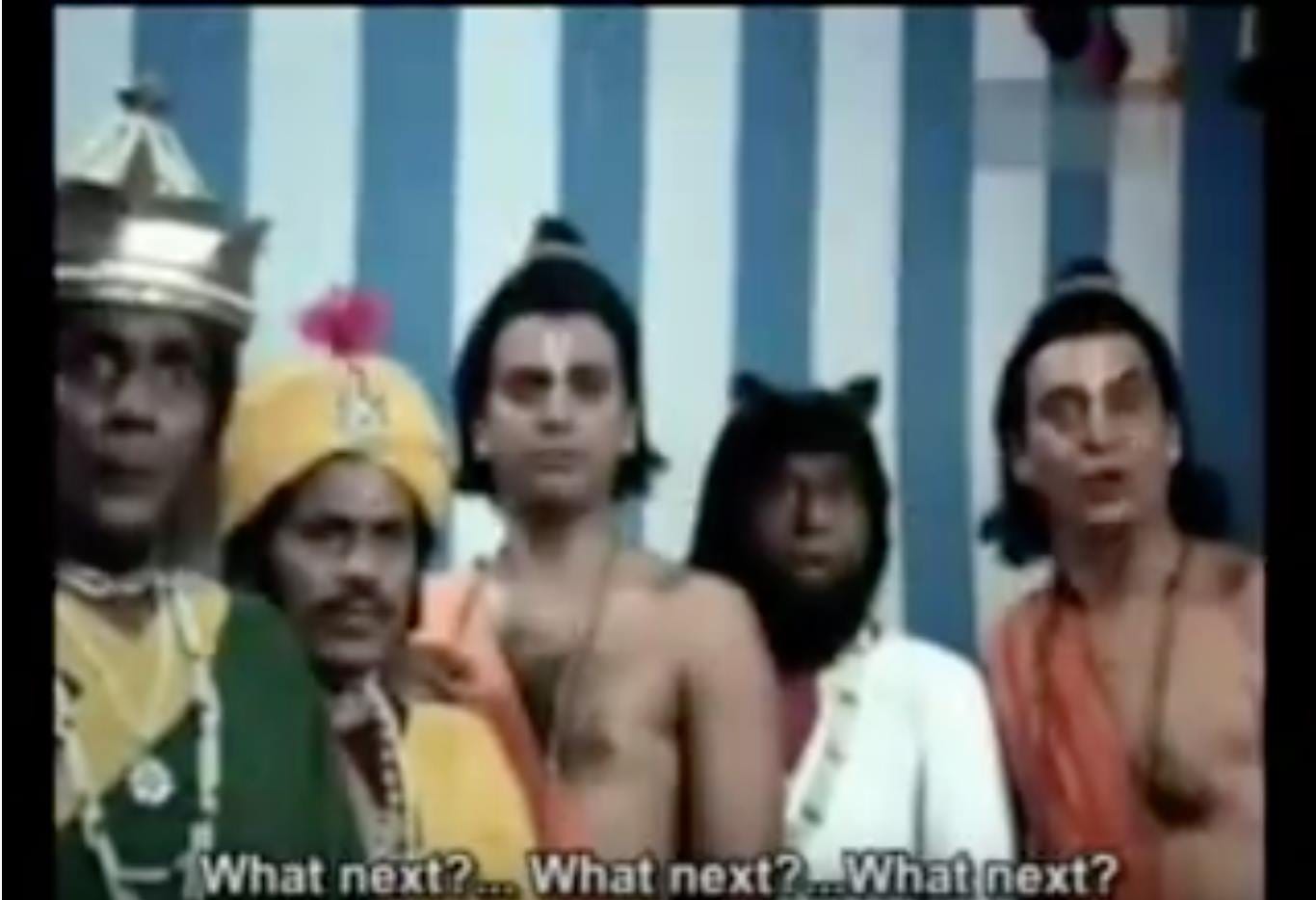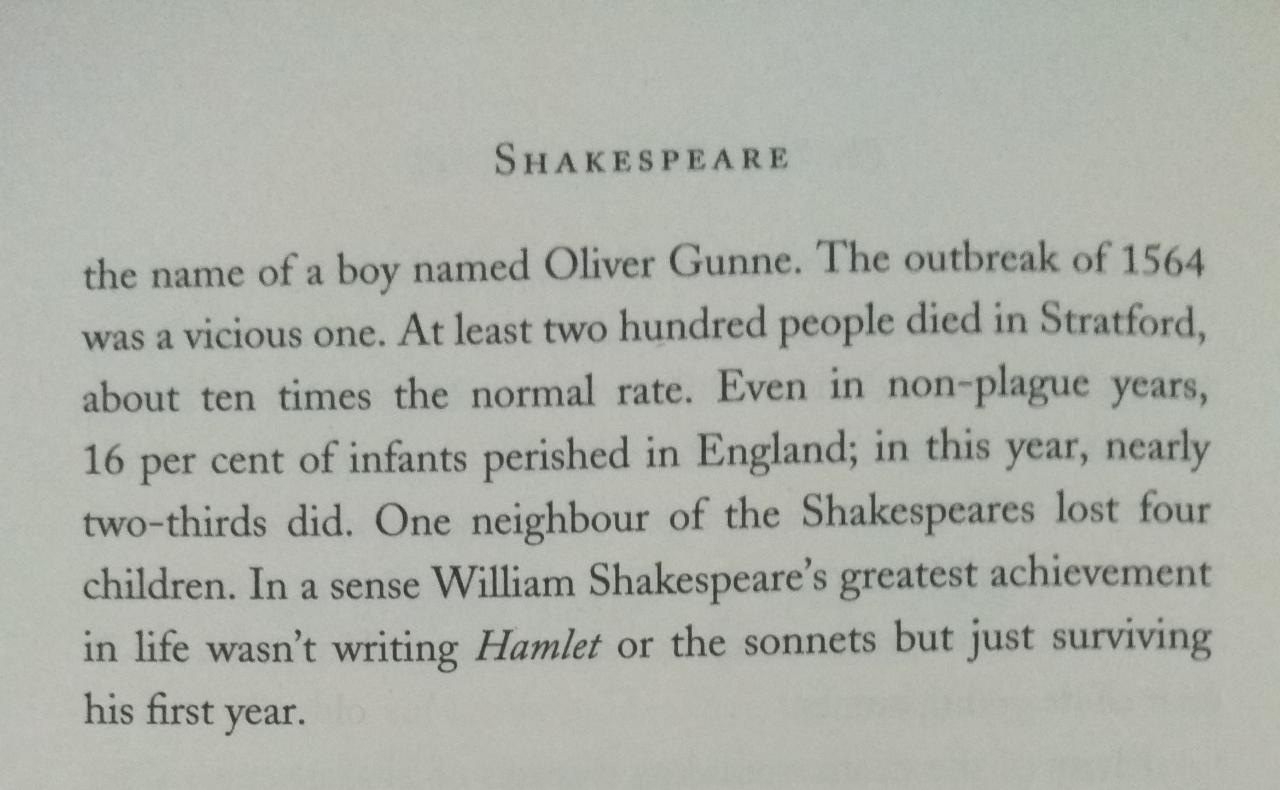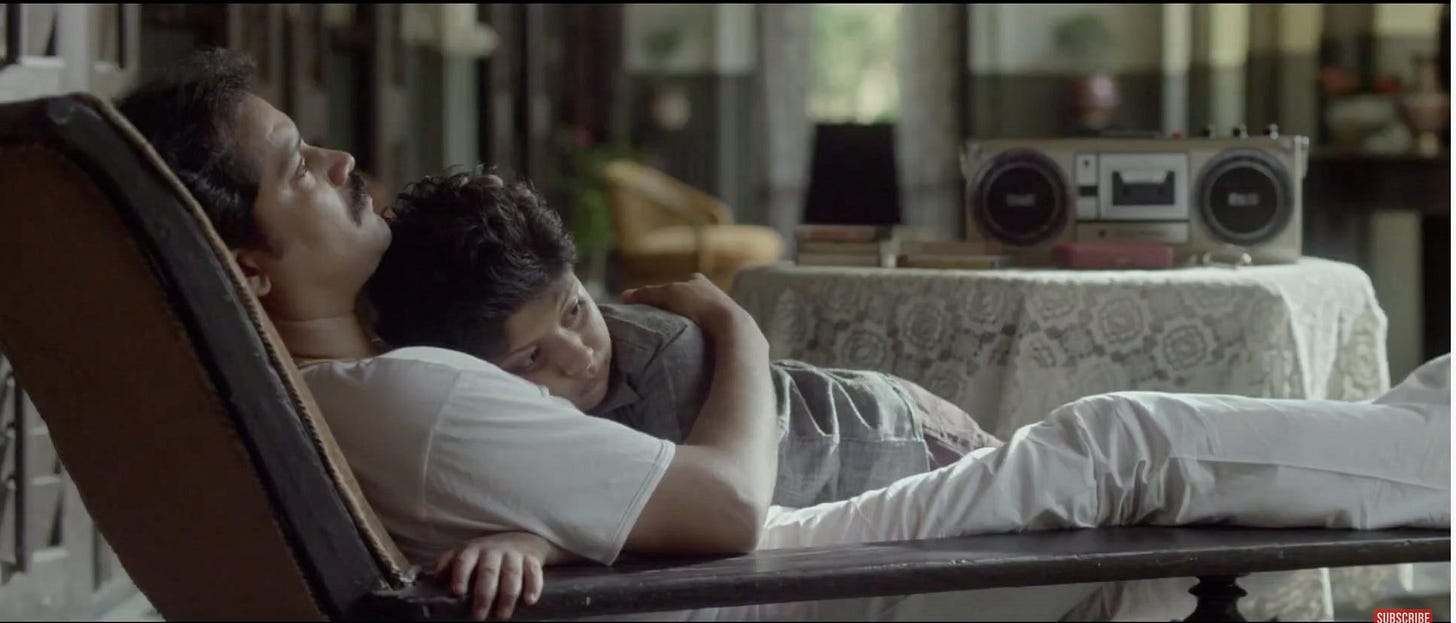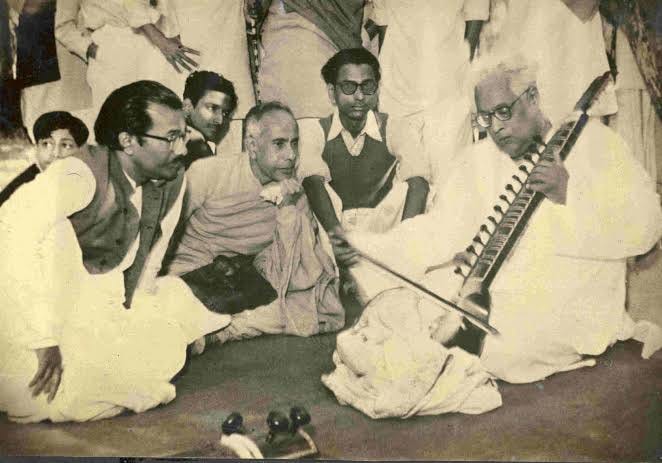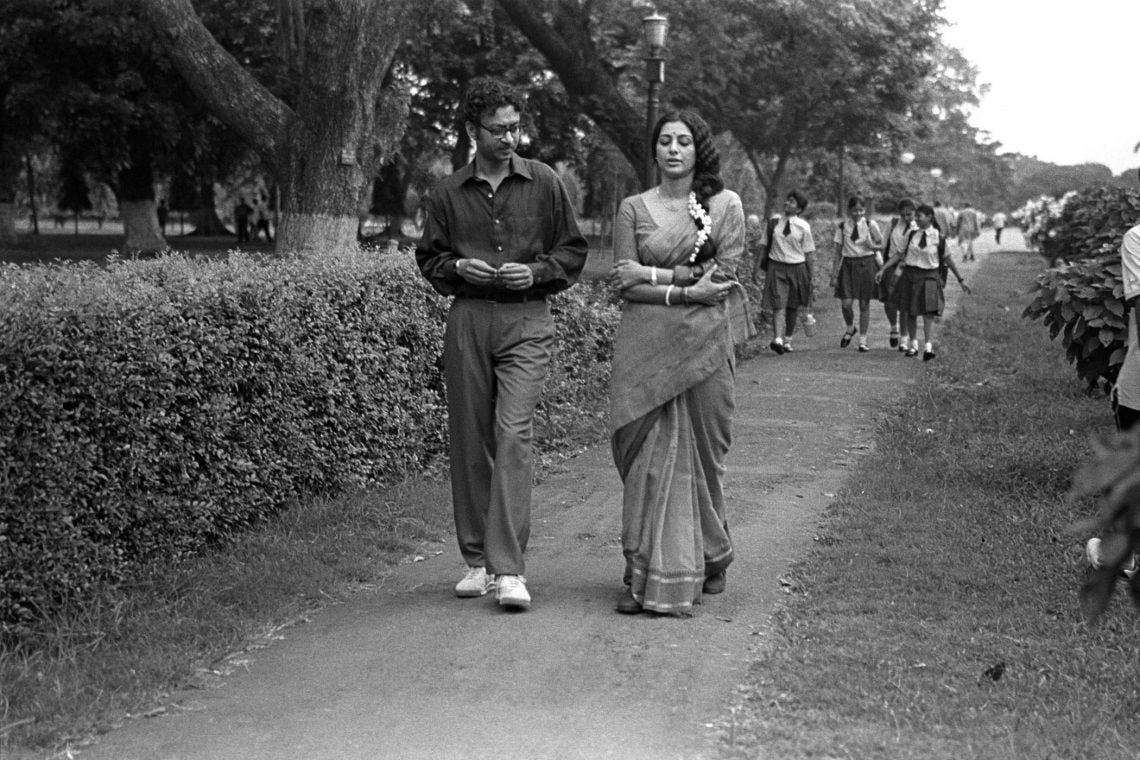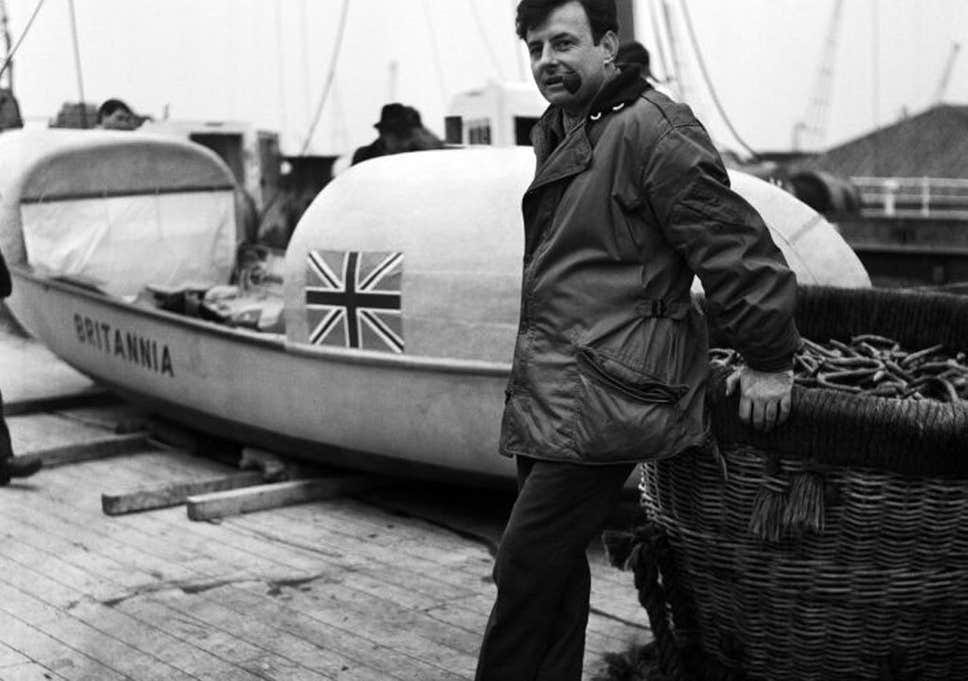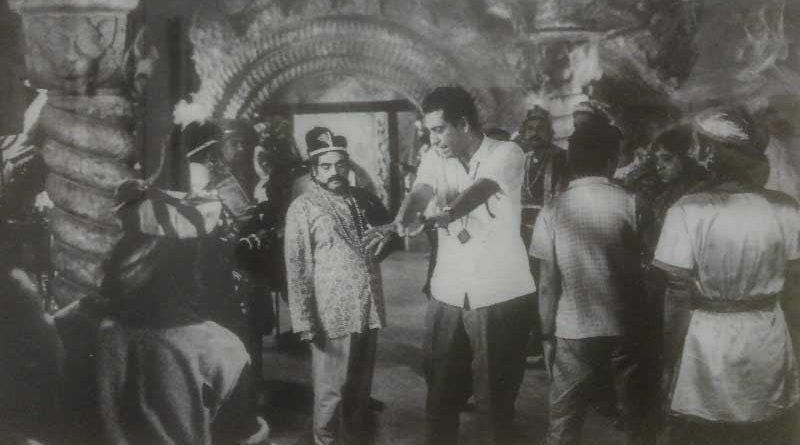Link to the first dump.
Link to the second dump.
Link to the third dump.
30/03/2020
The 90s is indeed back. Today marks the 28th anniversary of Satyajit Ray being awarded with an Honorary Oscar. B.R. Chopra’s Mahabharata is back on telly, thanks to Covid-19. This is quite an opportune moment to recollect that both Satyajit and his father, Sukumar Ray wanted to work on their own respective interpretation of the great epic. Sukumar, a champion of what we call nonsense verse (although needless to say his words make more sense if we look back from now) had already written Lakshman-er Shaktishel, a satire laden with his trademark humour, on a specific incident from the Ramayana. Unfortunately, he passed away at the tender age of 36, having barely started with the project.
Satyajit was interested in working with the Mahabharata from the 1950s itself. But the sheer volume of the work made him restrict his vision to the dice game only. However, the introduction of the cast to a non-Indian audience bothered him, as did the barrier of language, given he wanted it to be a grand affair with an ensemble cast, even thinking of roping in Toshiro Mifune. Talking of B.R. Chopra’s television saga, Satyajit was not particularly impressed, something he made abundantly clear in his penultimate film Shakha Prasakha, through a dialogue spoken by one of the brothers, in stark contrast to the ladies of the house. This was when the programme was at the height of its success, putting a halt to all activities on Sunday mornings.
In fact, just like the Mahabharata, Shakha Prasakha too was conceived in the 50s. But to our utter misfortune, the former did not see the light of the day. One can only assume what an ambitious spectacle it would have been!
Ray did include a short performance of Lakshman-er Shaktishel, in the documentary he made on his father. Here we see Chiranjeet, a superstar in Bengali mainstream movies, playing the titular character, in what was his only on-screen association with Ray. Soumitra Chatterjee, Satyajit's own Toshiro Mifune, played the role of Rama.
Chiranjeet (or the artist previously known as Deepak Chakraborty) was a gifted illustrator who also did the cover of Sandesh, the family magazine resurrected by Ray. For many of us born in this part of the world, old issues of Sandesh were a perfect accompaniment to many a summer afternoon.
21/03/2020
Since Covid-19 has been mercilessly raging on, people have been taking to social media to post how the likes of Newton and Shakespeare dealt with the deadly plagues of their time. The 1665 plague is just a high point in that curve. The black death was rampant in Europe much before that and it made frequent cameos on a regular basis, so even if one could escape it the first time, there's hardly any surety that the same person could evade it on subsequent occasions.
The theatres, just like now, would close down when the situation would be out of control and would resume once the wave decreased significantly. Shakespeare reportedly improved on Macbeth and came up with King Lear, while being in this self-imposed isolation.
The world in 2019-20 is far better than what it was during Shakespeare's time. Any person from that era would happily trade, given how the overall lifestyle has significantly improved in these years. In terms of diseases, the plague would just get the top bill in an ensemble cast that had an array of fevers which had no significant treatment. The reigning monarch, Queen Elizabeth, barely managed to survive smallpox in 1562, two years before the birth of the future Bard of Avon.
Talking of Shakespeare's birth, Bill Bryson wrote: "In a sense, William Shakespeare's greatest achievement in life wasn't writing Hamlet or the sonnets but just surviving his first year."
This is to let you know that together, we will hang in there and defeat this cavernous feast. Shakespeare trounced the deadliest scourge of the previous millennium and left us 884,647 words, made up of 31,959 speeches, spread over 118,406 lines. In the process, he employed 138,198 commas, 26,794 colons and 15,785 question marks. I am sure, Covid-19 will just be a momentary semicolon in our lives.
05/02/2020
In one particular scene in 'Abyakto', the young Indra rests his head and his father strokes his hair as they listen to some classical music. Years later, he admits to his mother that though he could not understand the music at that age, it sure felt great to empathize with his father's happiness.
Arjunn Dutta's debut smells of Aparajito sans subtleties. The film looks like a spiritual extension of the same, yet the director masterfully meanders through the simple narrative, while maintaining the straightforward flow. For his first film, he has his heart in the right place. He chooses a seemingly uncomplicated subject, one that has been plaguing many Bengali households of late, upping it with a remarkable twist at the end.
Arpita Chatterjee (née Pal) plays the estranged mother, in what is possibly her career-best performance. An upbeat heritage house, Chatterjee with a penchant for Rabindra Sangeet, sure it reminds one of Rituparno Ghosh's 'Utsav' with fewer characters and without the titular festival, heightening the sense of loneliness that looms large when a son leaves to settle in another city.
Among the film's limited cast, the only one who interferes with Chatterjee's moments under the sun is Adil Hussain, who despite being a thespian extraordinaire, shines more in the Bengali films he does.
The only occasional impediment in an otherwise commendable debut is a few unnecessary conversations in English and a couple of repetitive dialogues. For a film which clocks at 87 minutes, they mar the otherwise brilliant editing and cinematography.
Bengali cinema in recent times hinges majorly on two formulae. The one, endorsed by a director duo, follows a melodramatic approach, a mere translation of tv serials onto the bigger screen, with works by Bengal's greatest literary figure sprinkled here and there. The other, championed by the self-proclaimed class topper, dwells on a few coups, hurriedly made into a collage, with filmmaking and storytelling, in general, taking a comfortable backseat.
In such a scenario, this is a decent watch and the director certainly deserves a pat on the back for his magnificent restraint. Add to that the usage of music, helmed by Soumya Rit, heavily relying on oriental instrumentation. Very rarely one comes across music which leads a film, allowing the previous dialogues to soak in.
Abyakto is an important film in these times. It speaks of the unvanquished spirit of unrequited love, of love that can't go beyond societal acceptance, of all that remains unsaid.
01/01/2020
Little more than a century ago, an M.Sc student finished writing his final paper within one and half hours, went out, lighted a cigarette and started smoking it rather nonchalantly. When the results were announced, the said student created a new record in the history of the University of Calcutta. The person who came second, more than 100 marks behind was Meghnad Saha, another eminent physicist.
The topper fiddled with Violin and Esraj in his spare time, heartily conversed with the women of the household on culinary matters for hours and was equally versed in Goethe and Nietzsche. If these weren’t enough, his name would be etched forever thanks to his collaboration with the greatest scientist of the century, Albert Einstein.
January 1 — the birth anniversary of Satyendranath Bose.
04/11/2019
A couple of years back, one fine morning in a guest house room in Patna, we chanced upon a few 90s songs. My comrades, brought up in post-liberalization India of that glorious decade, were evidently having their share of nostalgia, while a wide-eyed me remained fixated on watching a heroine perform some indescribable steps in the song "Ruk ruk ruk are baba ruk" from Vijaypath, opposite Ajay Devgan, who somehow always convinced me that those songs which he appeared in were some kind of classroom punishment meted out to a topper who just had a bad day.
I had always watched her in a 'different' kind of films and to associate Nimmi of Maqbool, Ghazala Meer of Haider, Neena Verma of Cheeni Kum, Meera Deshmukh of Drishyam or for that matter, Amrita of Abar Aranye with those dance steps befuddled me for a few minutes.
The year 2018 broke the ceiling of appreciation, with Andha Dhun. Looking back, it's very difficult to point out one single moment where she does not weave her magic into the realism of the screen but the one which stands out is that cooking scene where, among other shenanigans, she explains 'aphrodisiac', as a naturally stunned Anil Dhawan looks on.
Pick any actress in the history of Bollywood and they would kill to have at least one of the aforementioned films in their filmography, while Tabu goes on to include interesting titles with stolid regularity.
Who would have known that a very meek but restless Ashima Ganguli combining Rice Krispies and Planters peanut, a stranger in a strange land, would one day contemplate shooting the piano player?
Tabassum Fatima Hashmi, 48 today.
Photograph: Nemai Ghosh
20/07/2019
John Fairfax led a largely adventurous life. As a child, he was expelled from the Italian Boy Scouts for opening fire on a hut housing fellow scouts. His mother well understood her son and fled to Argentina. In his early 20s, he fell in with pirates and ended up spending three years smuggling guns, whiskey and cigarettes.
Yet his moment under the sun came on July 19, 1969, when he became the first person to row across an ocean solo when he reached Florida from the Canary Islands.
He basked in the glory, sadly just for a few hours, for the next day would be July 20, when the whole world watched Neil Armstrong and Buzz Aldrin walk on the moon. At the start of the decade, JFK promised the Americans what the citizens thought was sheer lunacy and the crew of Apollo XI turned that into reality.
1960s America was nothing short of a moveable feast. 1969 acted as the necessary icing on the cake.
There are other stories about the moon mission and the waves it created, like when President Jimmy Carter came to India, someone asked him for a plot of land on the moon. But those stories are for some other time...
08/05/2019
Those were the times when Uttam-Suchitra's cliched romance, garnished with the latter's relentless over-acting would light up the screens of Bengal. Someone in Calcutta, a friend of both the aforementioned individuals, decided to cast two faces with negligible star value and went on to make a film with hardly any on-screen romance, out-of-the-box choice of music in its pivotal sequence, no possible goosebumps-worthy scenes, zero sensationalization of cinematic moments and mind you, all such experiments when his regular producer had backed out and financially, the only things of value that he was left with were his favourite music records. The result: after starting off slowly, the film had a run of eight and half months, breaking all box office records of the day and along with it, all possible stereotypes that clouded the film industry. These days, when votes are asked at the cost of wars, when mindless chest-thumping happens to be a national percussion, the film would have been possibly panned, arresting the ire of people at the helm of affairs and worse still, the maker would have been deemed anti-national for coming up with a product that had, of all weapons, rosogollas stop an imminent skirmish.
Goopy Gyne Bagha Byne, 50 years today.



